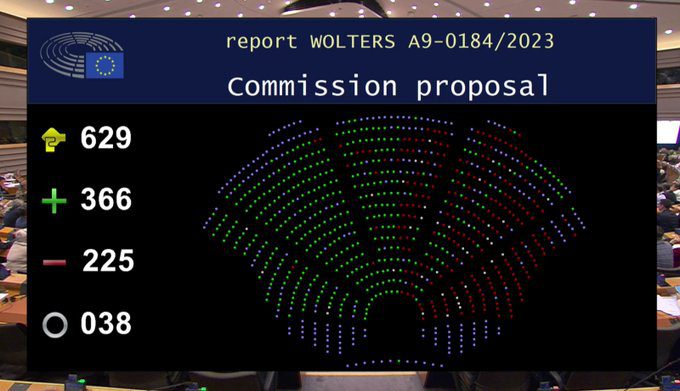
Companies larger than 250 people operating in the EU will be held accountable for human rights abuses and carbon emissions linked to their supply chains. The mandate went into effect Thursday, June 1st, as the European Parliament rubber-stamped new corporate diligence laws 366 to 225 in Brussels.
The EU’s Corporate Sustainability Due Diligence Directive (CSDDD) imposes fines of up to 5% of a company’s global revenue on firms found to be supporting bad environmental or human rights practices.
The Directive was first proposed by the European Commission in February 2022, just three days after Russia invaded Ukraine, and is the latest piece of EU legislation that helps deleverage the European economy away from authoritarian economies.
The CSDDD may be able to force companies to cease the production of strategically important green technology on human rights grounds. As with similar recent green protectionist legislation, the EU seems to be buttressing itself against a protracted global sanctions war against Russia and China.
🗳️ Vote results: 366👍 225👎 38⭕️
— European Parliament in ASEAN (@EPinASEAN) June 1, 2023
🟢 The European Parliament has adopted its position on new corporate sustainability due diligence rules for companies.
🔈Next step: #CSDDD negotiations with EU governments to start soonpic.twitter.com/ELcqzk7bgp
The new legislation affects companies with more than 250 employees and includes the financial services sector. There was some pushback, with a last-minute attempt by centre-right factions in the EPP to water down amendments, having failed to stop a compromise text of the CSDDD from passing at Thursday’s plenary session.
According to an insider’s report by Euractiv, EPP opposition to the CSDDD was led by German Christian Democrats with business associations warning that the raft of new regulations was a burden on companies.
Writing for The European Conservative this week, Hungarian MEP Enikő Győri disparaged the CSDDD as unnecessary bureaucracy that posed a risk to Europe’s competitiveness at a time when businesses are already under strain.
Solving human and social rights, as well as environmental problems, does not belong to the field of competence of companies. We should not delegate governments’ responsibilities to them. Firms are not, and should not act as, one another’s policemen.
His objections were echoed by AfD MEP Dr. Gunnar Beck who brandished the CSDDD as an attempt by the EU to get the private sector to conform to a “left-wing globalist agenda” in a statement to The European Conservative, one that risked worsening Germany’s already crippling inflationary fears.
The passing of the CSDDD met with universal acclaim from liberal and left-wing factions in Parliament with some human rights NGOs, such as Amnesty International, saying that the legislation did not go far enough to force financial firms to take into account human rights issues in their business dealings.
“If we don’t take a stand, who will?”@larawoltersEU calls on @Europarl_EN to support binding rules on responsible business.
— S&D Group (@TheProgressives) May 31, 2023
For too many companies, low prices are welcome, responsibility is not. This must change. It’s our job to set global standards.#CSDDD
Full speech 👇 pic.twitter.com/qEhrL6ZYuy
This is not the first time that the European Parliament has passed legislation to hold corporations to account for supply chain issues. The Non-Financial Reporting Directive and Conflict Minerals Regulation already force companies to hand over information regarding potential support of human rights abuses.
The CSDDD will now pass to the European Council, shortly to be led by the left-wing Spanish government with lawmakers hoping that it should come into effect before next year’s European elections.
